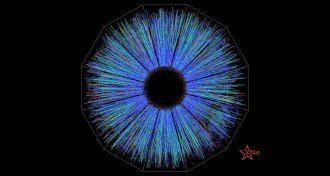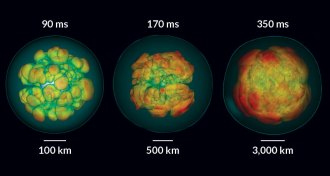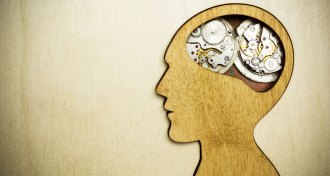All Stories
-
 Astronomy
AstronomyMiddling black hole may be hiding in star cluster
A black hole with about 2,200 times the mass of the sun has been detected. If confirmed, it could represent a new type of gas-starved black holes and hint at how supermassive ones may form.
-
 Astronomy
AstronomySupernova story continues, just like science journalism
Acting Editor in Chief Elizabeth Quill discusses science's enduring legacy and that of Science News.
-
 Health & Medicine
Health & MedicineReaders respond to antibiotics, carbon bonds and more
Allergic overreactions, the possibility of silicon-based life and more in reader feedback.
-
 Physics
PhysicsSmashing gold ions creates most swirly fluid ever
Collisions of gold ions create a fluid with more vorticity than any other known.
-
 Astronomy
AstronomyObservers caught these stars going supernova
Thirty years ago, astronomers witnessed a nearby stellar explosion, but it wasn’t the first. Humanity has been recording local supernovas for nearly two millennia.
-
 Astronomy
AstronomyWhen a nearby star goes supernova, scientists will be ready
Scientists hope to detect neutrinos and gravitational waves from a nearby supernova.
-
 Astronomy
Astronomy30 years later, supernova 1987A is still sharing secrets
The 1987 explosion of a star near the Milky Way 30 years ago set off years of fascinating findings.
-
 Neuroscience
NeuroscienceMysteries of time still stump scientists
The new book "Why Time Flies" is an exploration of how the body perceives time.
-
 Climate
ClimateHot nests, not vanishing males, are bigger sea turtle threat
Climate change overheating sea turtle nestlings may be a greater danger than temperature-induced shifts in their sex ratios.
By Susan Milius -
 Health & Medicine
Health & MedicineWeekend warriors put up a fight against death
Weekend warriors shove all their weekly activity into just one or two days, and it’s still enough to reduce mortality risk.
-
 Psychology
PsychologyLong-lasting mental health isn’t normal
Those who stay mentally healthy from childhood to middle age are exceptions to the rule.
By Bruce Bower -
 Animals
AnimalsA diet of corn turns wild hamsters into cannibals
Female European hamsters fed a diet of corn eat their young — alive. They may be suffering from something similar to the human disease pellagra.